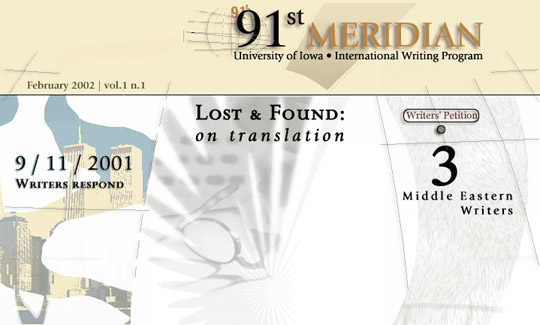The Urgent Need
The Urgency of Establishing a Different Culture for the New Century in Relation to the Tragedy of September 11, 2001 and to the Military Reaction of the United States - Man-sik Lee
On the 15th day of every month, a metropolitan city of 10 million inhabitants comes to a halt: cars, buses, bikes and trucks stop on the spot in the streets at the sound of the 2 o’clock siren. This is not fiction. This is a real story of what goes on in South Korea now. People walking on the street flock together towards the entrance of subway stations, students follow their teachers to the playgrounds of their elementary schools. One or two police vehicles rush along the almost-empty city streets on a sun-shining afternoon. What is taking place here in Seoul, the capital city of South Korea? Nothing! This is a brief description of a civil defense drill. The radio announces it’s not a real situation, but just a practice event.
One Sunday morning some 30 years ago, South Korea suffered a surprise attack by North Korean soldiers on the Blue House, which is its White House. Somewhere around 30 infantry soldiers walked perhaps 20 hours from North Korea, arriving actually just 500 meters from the entrance gate to the Blue House before they were spotted by a policeman. This was the real beginning of living with the fear of unknown and unexpected threat. This attack had caught the South Koreans suddenly and in a state of complete unpreparedness—much like what happened to the people of the United States on the fateful morning of September 11, 2001. The South Korean military government went on to try to take all possible measures not to experience another surprise attack of this sort from the North: the civil defense drill at 2 p.m. every 15th day of the month, the creation of national ID system, and the establishment of civil defense corps, in whose service every healthy Korean male must participate before the age of 55, having already finished his mandatory 3 year military service and continued service as a member of armed reserves. Actually, when at the age of 45 I was discharged from all these military service obligations some time ago, I was not happy; rather I felt my age, thinking I now was useless for any military service.
The incident at the Blue House came to serve as one of the good excuses for consolidating the military dictatorship—exactly contrary to the patent aim of the North Korean military planners, set on weakening the South Korean regime’s power. But despite the emphatic and continued promises of the South Korean government to prevent any further North Korean infiltration, every time when North Korea sent forth its well-trained commandos, the South Korean government with its own 600,000 soldiers was almost completely helpless. This is regardless of its notorious police force, including the helmeted riot police, which have proven to be quite effective in dealing with stone-throwing student demonstrators.
This is not because Seoul, the capital city of South Korea, is located no more than a 4 hour drive from Pyungyang, the capital city of North Korea. It’s simply because neither a nation nor a house can ever be completely protected from the infiltration of a small number of evil-doers.
I think that this is the right moment to think about the nature of a new culture for the 21st century. The tragedy of September 11, 2001, and the agonizing military reaction of the United States, are the signs signifying the urgency of the mater. The possible scenarios for solving the actual problems will be fully dealt with by military experts, and by political commentators.
The problem is that neither the nation nor the house will, nor can be, completely protected from evil-doers. I think the only choice left for us is to accept the terrible fact that our life is not, and will not, be perfect, no matter how hard we may try. So this could be the turning point of humbly accepting the notion of the incompleteness of the human being living in his finite body, a being who can not be God himself.
The fallacy of perfection and completeness can be found almost everywhere in the current culture. I will mention just two musical pieces, though they may seem too innocent to be politically interpreted. The first is “Peter and the Wolf,” a musical tale for children composed by Sergei Prokofiev.
Every morning Peter, represented by all the strings, opens the gate and goes out to the green meadow despite the grandfather’s warning, represented by the bassoons. Peter meets his friend the birds, represented by the flutes, and the ducks, represented by the oboes. The cat, represented by the clarinets, is only a minor threat to the birds and the ducks. The grandfather’s warning is realized when the duck is swallowed by the big gray wolf, represented by the horns. Of course, this is a musical piece. Even the cat and the wolf are represented by harmless musical instruments. We can easily predict the happy ending given the piece’s last sentence: “If you listen carefully, you can hear the duck’s quacking inside the wolf.” Even the swallowed duck is still alive.
On October 21, 2001, I enjoyed the Houston Ballet’s Firebird in the beautiful Hancher Auditorium. You can guess why I’m mentioning this. The story of the firebird is no different from that of Peter and the Wolf in terms of their fantasy of a perfect and complete world—a world which has been shattered by the tragedy of September 11, 2001.

-
9/11/2001: Writers Respond
- Torunn Borge, Too Little Seen
- Joy Goswami, Headless Torso
- Christopher Merrill, The Hour of Lead
- Chris Keulemans, Music in an Unsafe America
- Man-sik Lee, The Urgent Need
-
Lost and Found: On Translation
- Writers' Petition
-
Middle Eastern Writers


